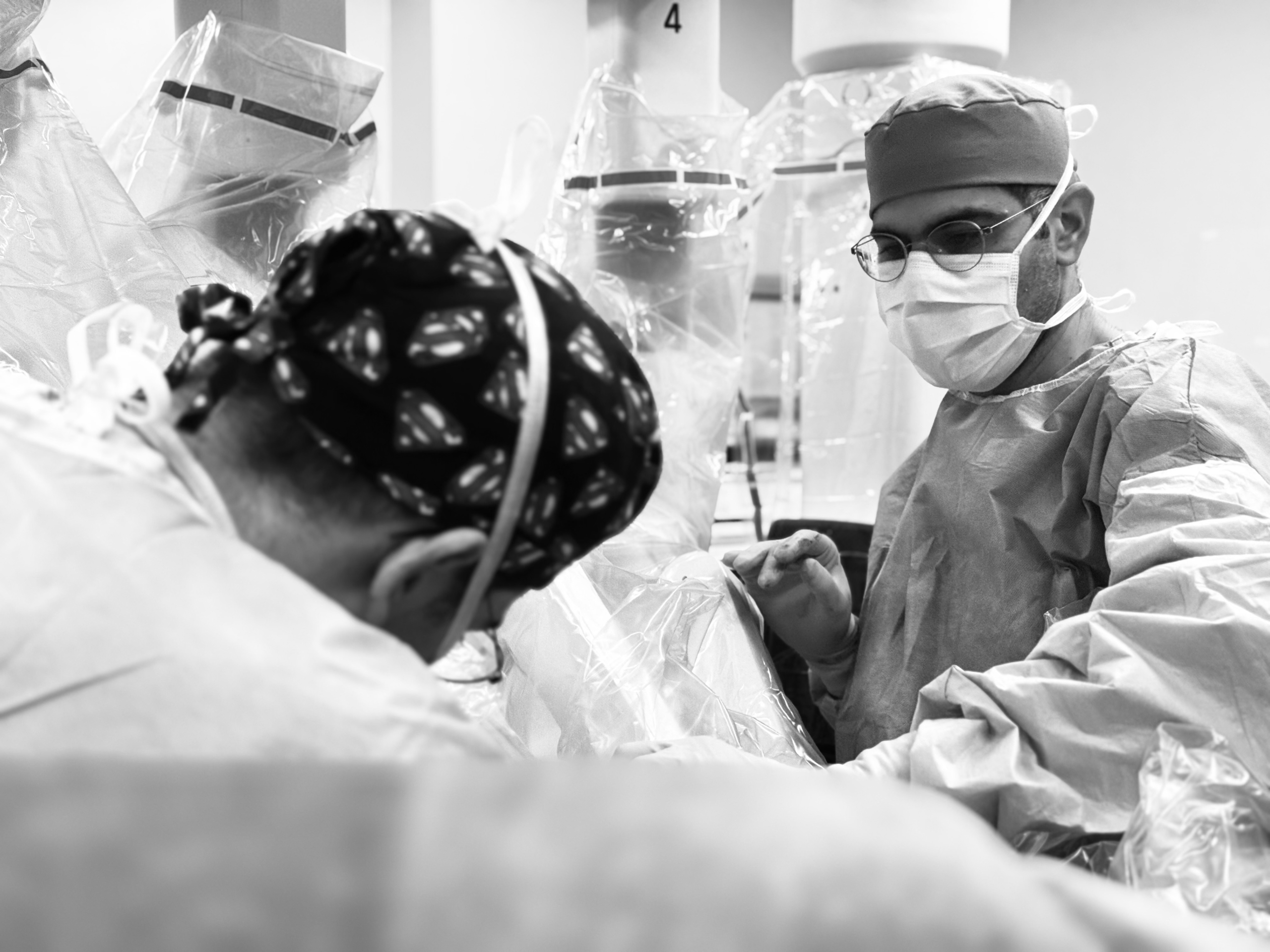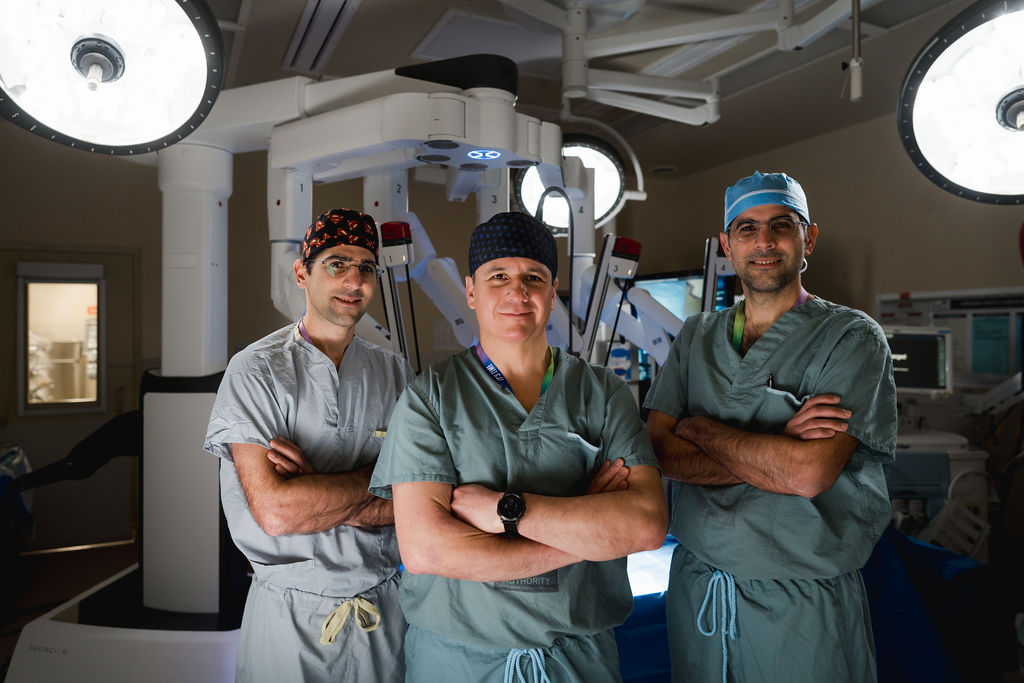Dr. Sepehr Khorasani (left) and Dr. Sohrab Khorasani (right) with General Surgery Division Head Dr. Cailan MacPherson
Surgeon brothers Sohrab Khorasani, a surgical oncologist, and Sepehr Khorasani, a colorectal surgeon, share a bond that runs deeper than most. This close connection has fueled their shared dream of pursuing medicine. From their teenage years to their time in medical school, the brothers navigated their journeys together, gaining hands-on surgical experience side by side. Today, both surgeons call Victoria home, where they bring their extensive knowledge and expertise to benefit the Island’s healthcare community.
Family Life And The Path To Medicine:
Dr. Sohrab Khorasani:
Initially, I didn’t think medicine was the right path for me. I started my studies at Simon Fraser University in electrical engineering, but after taking some electives in biomedical engineering, I quickly realized that medicine was where I wanted to be. I applied to medical school and was fortunate to be accepted alongside my brother. Together, we went through four years of medical school, five years of surgical residency and two years of sub-specialty training together! I chose to specialize in surgical oncology because I wanted to make a tangible difference in cancer care. Together with my fellow surgical oncologists, we’ve made significant strides in improving outcomes for our patients on Vancouver Island—and we’re not stopping. We’re constantly exploring new techniques and approaches to enhance patient care. I’ve been practicing in Victoria for five years now, and my wife and I just welcomed our first child. Victoria truly feels like home to us.
Dr. Sepehr Khorasani:
With just a two-year age difference, we were very close growing up. We shared similar interests and competed in sports at a high level, which only strengthened our bond. My brother and I were the only children so our family of four has always been close-knit, and when we immigrated to Canada from Iran, that sense of togetherness remained unchanged. We felt welcomed by our new country and quickly made it our home. When it came time to choose our careers in medicine, our passions naturally aligned—we both knew we wanted to make a meaningful difference.
Choosing A Surgical Specialty:
Dr. Sepehr Khorasani:
I always knew I wanted to become a surgeon. From a young age, I had an interest in anatomy. I like the hands-on aspect of the surgical specialty where one can make a tangible and often immediate positive effect in the lives of their patients. I ended up doing a subspecialty in colorectal surgery. There is a wide variety of conditions that we can treat right here on the Island ranging from benign to very complex malignant conditions affecting the colon and rectum. Our colorectal surgical team is capable of caring for patients with almost any colorectal condition. Seeing the positive difference it makes for our patients when they can receive treatment close to home is truly rewarding. I’m working with my fellow surgeons to enhance care and create more treatment options for a variety of colorectal conditions. This includes a comprehensive multidisciplinary approach to care of patients with inflammatory bowel disease and colorectal malignancies on the Island.
Dr. Sohrab Khorasani:
I chose to pursue a career in surgical oncology. My specialty is mostly in intra-abdominal malignancies, rectal cancer, gastric cancer and sarcomas. There are so many aspects I like about surgical oncology. From a technical standpoint, we approach every tumor differently, uniquely. Oncologists build relationships with their patients just like any other field of medicine. There’s sometimes a misconception about surgery that you meet patients, you operate on them once and then you don’t see them again. With cancer patients, we tend to follow them for years after their treatment. We take a multidisciplinary approach to patient care and the science is always evolving, meaning we’re always working to make cancer care better for our patients on Vancouver Island. We stay involved in research and attend professional development activities such as courses and conferences. The most rewarding part of the job is that you get to make a positive difference in a patient’s life at a very difficult time.
 On The Arrival Of Surgical Robotics At RJH:
On The Arrival Of Surgical Robotics At RJH:
Dr. Sepehr Khorasani:
This is a very exciting time for colorectal surgery on the Island. Beginning this spring, my brother Sohrab, Dr. Cailan McPherson and I will be the first general surgeons to perform robotic assisted surgeries here. We know there are improved outcomes with robotics for rectal cancer and rectal surgeries; more importantly, the surgeries will be minimally invasive. When surgeries are performed using robotics, the benefits are clear: a reduced likelihood of converting to open surgery, faster recovery of bowel function, less reliance on pain medication, and shorter hospital stays. One of the main challenges in rectal surgery is navigating the confined space in the pelvis. With robotic assistance, surgeons gain enhanced range of motion, better visualization, which allows for better access to these tight spaces. This improved access significantly enhances a surgeon’s ability to treat the patient, ultimately making a real difference for those requiring colorectal surgery.
Dr. Sohrab Khorasani:
With the arrival of the da Vinci robot at RJH, it’s opening new opportunities for us to operate on patients and address difficult cases with more of a minimally invasive approach. For general surgery, we’re particularly excited about using robotics for rectal and pelvic cancers, where patients stand to gain the most. This approach promises faster recoveries, shorter hospital stays, and the added convenience of having surgery done close to home. It’s a game-changer for patients on the Island, as it means they can receive care for the most complex cancer and surgical diagnosis here, with more options to have those surgeries performed using minimally invasive techniques. We can ensure they have the necessary support systems in place before they even leave the hospital. We know that patients recover better when they’re surrounded by family and close to home, and with the robot, we can offer more advanced procedures right here. It’s a major step forward in delivering leading-edge care to our patients.
On Bringing New Surgical Techniques To Vancouver Island:
Dr. Sohrab Khorasani:
We’re committed to expanding the range of best-in-class treatments available in our province and country. Our surgeons are continuously broadening their subspecialties and pursuing additional training to enhance the care we can offer patients on Vancouver Island. Personally, one of my areas of expertise is stomach and gastric cancer, including minimally invasive surgery for stomach cancer. Since coming to the Island, I’ve been able to make meaningful contributions in this field, and alongside my surgical oncology colleagues, including Dr. Darren Biberdorf. We’ve successfully introduced more minimally invasive procedures for stomach cancer. I was fortunate to travel to Japan recently for specialized training in new techniques for minimally invasive surgery, and since returning, we’ve been able to implement those methods here in Victoria. It’s been incredibly rewarding to offer these advanced treatments locally, improving outcomes for our patients.
Dr. Sepehr Khorasani:
My work involves treating both benign and malignant colorectal conditions, as well as performing minimally invasive complex rectal surgeries, including rectal reconstruction. I can confidently say that the volume and complexity of the work we do on the Island is on par with the most advanced colorectal surgeries performed in Vancouver or anywhere else in the country. As a colorectal surgeon and clinical assistant professor at UBC, I have had the privilege to contribute to the training of future physicians and surgeons. I also continue to be involved in research and leadership roles that enhance patient care, including serving on the executive committee for the Canadian Society of Colon and Rectal Surgeons and being the surgeon lead for British Columbia’s Clinical Care Pathway for Rectal Cancer at the BC Cancer Agency.
Working With The Victoria Hospitals Foundation:
Dr. Sohrab Khorasani:
I can’t imagine being able to do the work I do without the support of the Foundation and the generosity of its donors. As a surgeon, my goal is to help as many patients as possible, and new possibilities arise when the Foundation funds crucial equipment, like the robotic systems, that enable us to reach more people and improve care. The Foundation serves as a vital resource where we can communicate our needs and direct funds toward areas that will have the greatest impact. It’s truly invaluable. Technology is advancing rapidly—just look at how frequently new iPhone models are released. These innovations are making surgeries safer and recovery times faster, helping us achieve what we all want: a healthy return to normal life. I want to extend my heartfelt thanks to all the donors who are making this progress possible.
Dr. Sepehr Khorasani:
There are no words to describe the generosity of the donors who give to the Victoria Hospitals Foundation. The level of humanity, care, concern, and generosity in this community is truly unmatched. People are willing to give their hard-earned money—sometimes even their life’s work—to support our hospitals and help others. A heartfelt thank you to the donors for continually stepping up to support our local hospitals.





